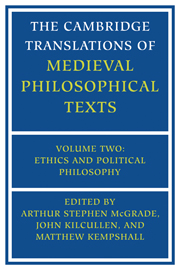Book contents
- Frontmatter
- Contents
- Preface
- General Introduction
- 1 ALBERT THE GREAT: Questions on Book X of the Ethics
- 2 BONAVENTURE: Conscience and Synderesis
- 3 GILES OF ROME: On the Rule of Princes (selections)
- 4 PETER OF AUVERGNE: Commentary and Questions on Book III of Aristotle's Politics (selections)
- 5 HENRY OF GHENT: Is It Rational for Someone without Hope of a Future Life to Choose to Die for the Commonwealth?
- 6 GODFREY OF FONTAINES: Does a Human Being Following the Dictates of Natural Reason Have to Judge that He Ought to Love God More than Himself?
- 7 JAMES OF VITERBO: Does a Human Being Have a Greater Natural Love for God than for Himself, or Vice Versa?
- 8 GODFREY OF FONTAINES: Reply to James of Viterbo on Love of God and Self
- 9 HENRY OF GHENT: Is a Subject Bound to Obey a Statute When It Is Not Evident that It Promotes the Common Utility?
- 10 GODFREY OF FONTAINES: Are Subjects Bound to Pay a Tax When the Need for It Is Not Evident?
- 11 JAMES OF VITERBO: Is It Better to Be Ruled by the Best Man than by the Best Laws?
- 12 JOHN OF NAPLES: Should a Christian King Use Unbelievers to Defend His Kingdom?
- 13 WILLIAM OF OCKHAM: Using and Enjoying
- 14 AUGUSTINE OF ANCONA: Summa on Ecclesiastical Power (selections)
- 15 WILLIAM OF OCKHAM: Is an Errant Individual Bound to Recant at the Rebuke of a Superior?
- 16 JEAN BURIDAN: Questions on Book X of the Ethics
- 17 JOHN WYCLIF: On Civil Lordship (selections)
- Index
16 - JEAN BURIDAN: Questions on Book X of the Ethics
Published online by Cambridge University Press: 05 June 2012
- Frontmatter
- Contents
- Preface
- General Introduction
- 1 ALBERT THE GREAT: Questions on Book X of the Ethics
- 2 BONAVENTURE: Conscience and Synderesis
- 3 GILES OF ROME: On the Rule of Princes (selections)
- 4 PETER OF AUVERGNE: Commentary and Questions on Book III of Aristotle's Politics (selections)
- 5 HENRY OF GHENT: Is It Rational for Someone without Hope of a Future Life to Choose to Die for the Commonwealth?
- 6 GODFREY OF FONTAINES: Does a Human Being Following the Dictates of Natural Reason Have to Judge that He Ought to Love God More than Himself?
- 7 JAMES OF VITERBO: Does a Human Being Have a Greater Natural Love for God than for Himself, or Vice Versa?
- 8 GODFREY OF FONTAINES: Reply to James of Viterbo on Love of God and Self
- 9 HENRY OF GHENT: Is a Subject Bound to Obey a Statute When It Is Not Evident that It Promotes the Common Utility?
- 10 GODFREY OF FONTAINES: Are Subjects Bound to Pay a Tax When the Need for It Is Not Evident?
- 11 JAMES OF VITERBO: Is It Better to Be Ruled by the Best Man than by the Best Laws?
- 12 JOHN OF NAPLES: Should a Christian King Use Unbelievers to Defend His Kingdom?
- 13 WILLIAM OF OCKHAM: Using and Enjoying
- 14 AUGUSTINE OF ANCONA: Summa on Ecclesiastical Power (selections)
- 15 WILLIAM OF OCKHAM: Is an Errant Individual Bound to Recant at the Rebuke of a Superior?
- 16 JEAN BURIDAN: Questions on Book X of the Ethics
- 17 JOHN WYCLIF: On Civil Lordship (selections)
- Index
Summary
Introduction
Jean Buridan's dates of birth and death are uncertain, but he is known to have been active in the University of Paris between 1328 and 1358. He spent his whole working life as a Master of Arts (unlike many other wellknown medieval philosophers, who were theologians). He wrote on logic and produced commentaries in question form on many texts of Aristotle. His questions on Aristotle's Ethics break off at the beginning of Question 6 of Book X and may be his last work.
The questions on Book X are concerned with two main topics, freedom and happiness. The connection is that freedom in one sense, namely, ‘freedom of final ordering,’ is to be attributed to the activity that is the ultimate end of human life, which is also happiness. Freedom of final ordering is not what philosophers these days mean by free will. ‘Final ordering’ means ordering or directing toward an end (finis); freedom of final ordering is characteristic of something that is an end in itself and not a means ordered to some further end. We can understand why this is called freedom by considering Aristotle's understanding of the difference between free persons and slaves: Free persons live for themselves, slaves exist for the benefit of others. Hence Aristotle's description of ‘the free’ as that which exists ‘for its own sake and not for the sake of another.’ The act in which happiness consists will be free with freedom of final ordering since it is not for the sake of anything else.
- Type
- Chapter
- Information
- The Cambridge Translations of Medieval Philosophical Texts , pp. 498 - 586Publisher: Cambridge University PressPrint publication year: 2000
- 51
- Cited by



